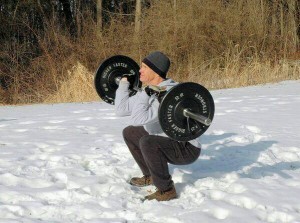
Part of Dr. Rand’s regular exercise routine
Johanan Rand, M.D. of Healthy Aging Medical Centers in Essex County New Jersey knows that hormonal deficiencies and imbalances can cause male patient suffering from DHEA deficiencies to feel tired and run down with a variety of symptoms. Dr. Rand can help men rebalance their hormones using hormone therapies and a combination of nutrition, exercise and supplements. He combines decades of practical medical knowledge of hormone imbalance with his own healthy and active lifestyle (healthy diet, supplement program, and a weight training and cardio regimen including yoga and martial arts) to deliver a comprehensive wellness package tailored to each male patient with DHEA deficiencies.
In men, DHEA is a hormone that is produced in both the adrenal glands and the brain, and it is most abundant during a man’s early 20’s and 30’s. Typically, it tends to be higher in men that perform regular amounts of exercise; however, it usually tends to decline in men after the age of 30. Several factors can affect the production of DHEA, and some of these factors may include stress, aging, lack of nutrition, or lack of exercise. DHEA is an essential male androgen, and it helps men to perform numerous functions, and it works with several other hormones, such as cortisol, thyroid hormone, and testosterone. DHEA can help to reduce the negative effects of cortisol, which is the body’s anti-stress hormone. It also works with thyroid hormone to be more active in the body and control metabolism. Lastly, DHEA is a building block for testosterone, which is the primary male sex hormone that governs almost all male related functions in the body.
Some of the other functions of DHEA may include:
- Reducing Inflammation
- Building Testosterone
- Lowering Cholesterol
- Improving Memory
- Lowering Triglycerides
- Making Thyroid Hormone More Active
- Controls Levels of Other Hormones
- Balances Insulin
- Improves Immune Function
- Increases Bone Strength
- Reverses Negative Effects of Cortisol
- Promotes Recovery from Short Term Stress
Stress & DHEA
Men that are under unusually high amounts of stress for extended periods of time may tend to have lower levels of DHEA than other men that have calmer, slower paced lives. High levels of stress cause the body to pump out adrenaline in order to provide the body with more energy to meet a challenge, which over stimulates the body’s fight or flight response, and when the adrenaline is not used up, it can become toxic or inflammatory. The body cannot tell the difference between emotional stress and physical stress, and the reactions of pumping out adrenaline are the same. In order to clean up the inflammation caused from unused adrenaline, the body releases cortisol, which is a steroidal hormone that reduces inflammation. Over time, the body may run low on cortisol, which forces it to break down the molecules of DHEA to make more cortisol in order to lower internal inflammation. In time, this can create a deficiency of both DHEA and testosterone and other health issues, such as adrenal fatigue syndrome.
Men with lower levels of DHEA can experience adrenal fatigue syndrome, which is typically associated with high stress. Because stress eats away at DHEA and other important hormones, the adrenal glands may become exhausted, which produces both mental and physical fatigue. Men may with low levels of DHEA that are experiencing adrenal fatigue may also feel mentally foggy, unsocial, burned out, or have intolerance to stress. They can also suffer from difficulty getting out of bed in the morning, insomnia, and cravings for salty or sweet foods. Replenishing DHEA with bioidentical hormone replacement therapy can reduce the effects of stress and greatly benefit the adrenal glands, and it can also help men to prevent or eliminate the symptoms of adrenal fatigue syndrome.
DHEA & Low T
This adrenal hormone is essential for the production of testosterone. DHEA is a building block for molecules of testosterone, and when levels of this hormone are low, men may become unable to produce testosterone. This can be especially dangerous for men that are middle-aged or experiencing the phase of male hormone decline, which is known as andropause. For men going through andropause or that are in their forties and fifties, testosterone levels may have already plummeted to all time lows, and a lack of DHEA can aggravate an existing deficiency. Low levels of testosterone can cause men to suffer from hair loss, erectile dysfunction, fatigue, low libido, headaches, depression, lack of motivation, muscle atrophy, anemia, high blood pressure, and increased aches and pains. Replenishing levels of DHEA with bioidentical hormone replacement therapy can help to prevent a testosterone deficiency, and men can improve their overall levels of health and wellness.
Dr. Rand at Healthy Aging Medical Centers in New Jersey tailors programs to suit his patients and supplement male health. Bioidentical hormone replacement is one therapy that can help men rebalance DHEA and improve endocrine system functioning. Dr. Rand’s other therapy options include IV therapies, supplements, and detailed lab testing. The comprehensive Healthy Aging Male Program includes several treatment modalities that can help men achieve pinnacle levels of health. Men that take part in the Healthy Aging Program are able to have around the clock access to Dr. Rand through email, texts, or phone calls. At Healthy Aging Medical Centers, Dr. Rand provides personalized anti-aging services tailored to each patient working to fix their DHEA imbalance. He is an expert at regaining vitality and you too can achieve youthful high energy levels and lead an active lifestyle like Dr. Rand with his guidance.
Men can reduce age related hormonal deficiencies and learn how to safely and correctly supplement DHEA by calling Healthy Aging Medical Centers in New Jersey at 973.435.0433.
